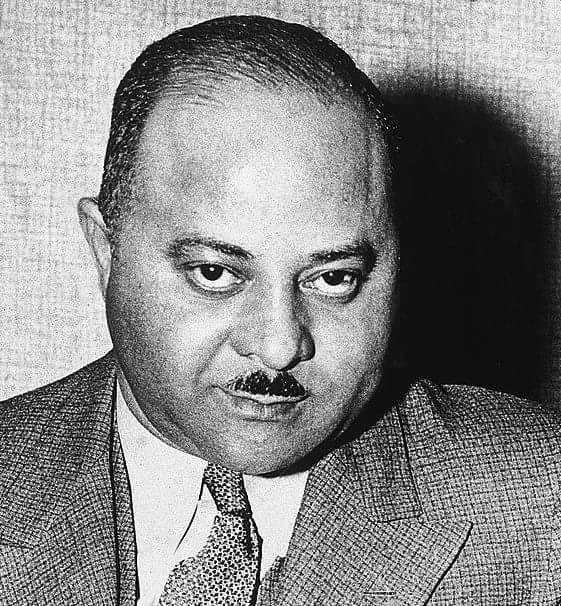
For more than 20 years, John W. Roxborough and Everett I. Watson lived the high life as two of Paradise Valley’s most powerful men and all that came with it.
Glorious summers at Idlewild, a black-owned resort situated on the western side of the state near Lake Michigan. Memorable evenings at the Norwood and Gotham hotels complete with fat cigars, fine liquor, great music and leisurely gambling.
As leaders of the Big Four Mutual and Yellow Dog Mutual outfits, respectively, they helped to run a $10 million a year illegal lottery business. Roxborough helped to manage world heavyweight boxing champ Joe Louis; Watson had managed another Motown heavyweight boxer named Roscoe Toles.
Millionaires, according to some accounts, Roxborough and Everett were neighborhood philanthropists. Gambling outfits were essentially the black bank because white-owned commercial financial institutions rarely lended to African Americans. The men donated money to the Detroit NAACP as well as community centers and families.
SCANDAL ROCKED CITY HALL AND PARADISE VALLEY
On August 5, 1939, Janet McDonald took her, as well as the life of her young daughter, after a dispute with her lover who refused to marry her. She died from carbon monoxide poisoning caused by trapped automobile gas fumes in a closed garage. McDonald left a note behind for local, state, and federal officials. In the note, she claimed to be the girlfriend of William McBride who was a bagman for illegal numbers game racketeers and willfully protected by Police Lieutenant John P. McCarthy who took bribes to look the other way.
On April 24, 1940, a one-man grand jury headed by Judge Homer Ferguson reigned in 135 defendants, including 78 Detroit policemen. He later handed down indictments on Roxborough and Watson; former mayor Richard Reading; former Wayne County sheriff Thomas Wilcox; and former Detroit police superintendent Fred Frahm.
Reading stood grimed faced, his eyes locked facing directly in front of him, his hands in his pockets. Defiant, the normally jovial the former mayor declared:
“It’s a lot of nonsense. It is ridiculous. I don’t even know what policy is. I don’t know what it is all about.”
At his arraignment, a stoic and unfazed, Roxborough chewing on a big cigar was quick to declare that whatever charges were leveled at him, his friend and client Joe Louis wasn’t involved.
On December 15, 1941, a jury of eight women and four men threw the book at Reading, Roxborough, and 20 others guilty of conspiracy with operation of a $10 million a year numbers and policy gambling racket during the years 1938 and 1939. “This is the greatest injustice since the crucifixion of Christ,” Reading declared at the time.
On December 29, 1944, during the midst of the festive holiday season, Roxborough and Watson were introduced to a cold, matchbox-sized, ten-foot-long by six-foot wide Jackson Prison cell. Their iron bar neighbors were an assortment of common punks: pedophiles, dope pushers, serial burglars, con man, and murderers.
Roxborough fought the case with vigor appealing to the state Supreme Court and ultimately petitioned the United States Supreme Court but the nation’s high court refused to review the case.
“I was just a loaner,” Roxborough argued two decades later in 1966. “Just lent the outfit money to get started.”
HOW THE NUMBERS GAME WORKED
Gamblers had to guess the ‘number’ for the day.
Called the “poor man’s gamble,” the essential difference between policy and numbers was that policy winning numbers were carried out by a daily drawing from a drum. The numbers game was carried out by drawing winning numbers from horse race tracks.
In a feature called “Policy a Game for Poor Man,” The Detroit News described the operation this way:
“Despite the smallness of the coins on which it is built, the numbers racket is Big Business. The annual profit to the operators of the racket in Detroit has been estimated at $3.5 million, which means a yearly business of the $10 million because a third of the full ‘take’ finds its way into the hands of the promoters.
An army of more than 6,000 men and women is employed by the racket in the Detroit area, according to investigators. From records seized, it has been estimated that the average payoff to the winning players is about 16 percent. The ‘writers’ –the men and women who go out and write the bets—get 25 percent of all they take in. ‘Pick-up men,’ who collect the money and bets from the writers, get 10 percent of all they take in. That totals 51 percent. The promoters get the rest, for themselves and for overhead.”
THE AFTERMATH
Released from prison in 1946, Roxborough and Everett served one year, nine months and five days. Popular entertainment businessman Sunnie Wilson said this about Roxborough and Watson in his memoir Toast of the Town: The Life and Times of Sunnie Wilson:
“Despite Mr. Roxborough’s intransigence, I believe he and Mr. Watson were singled out by the investigation in order to set an example. The city’s attempt to break up the numbers hurt the economic condition of the black community. Black Detroiters saw the trial as a direct attack on their community…The only difference between the black folks’ policy and state-run lottery is that we had three digits and current game has six.”
Everett I. Watson died in 1960; John W. Roxborough died in 1975.
Ken Coleman, Detroit-based author and historian, writes about the Detroit numbers business as well as John Roxborough, Everett Watson and Sunnie Wilson his book “Million Dollars Worth of Nerve.” Visit www.onthisdaydetroit.com